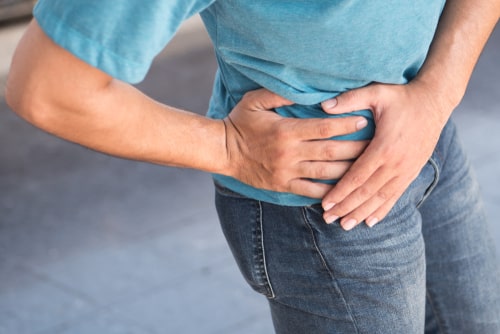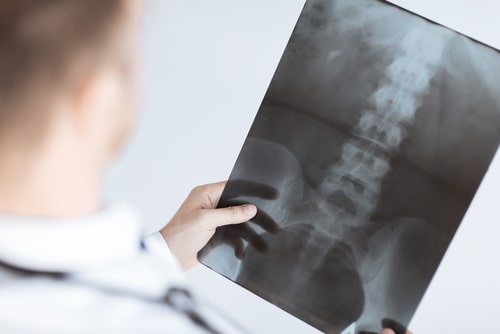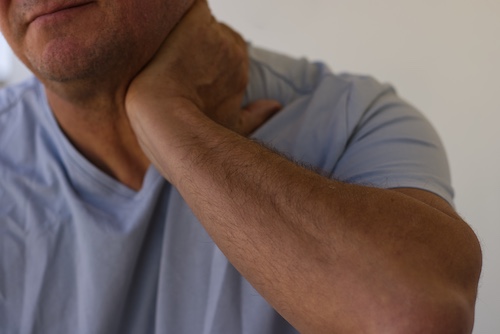The hip is one of the major load-bearing joints in the body. Nearly every movement involves the hip in one way or another. Hip injuries are also quite common following car crashes. The pain can range from mild to severe. No matter the kind of pain, seeking hip injury treatment after a car crash can help you avoid long-term damage.
If you have suffered a hip injury in a car accident, it’s important to understand the extent and severity of your injuries and the steps to take to make a full recovery. Georgia Spine and Orthopaedics has a team of specialists who can provide you with the care you need to become mobile, active, and pain-free again.
Call us today at 678-929-4494 to get the high-quality, personalized care you need from experienced orthopedic specialists in Georgia.
What Should I Do if I Have Hip Pain After a Car Accident?
We cannot stress this enough, if you’re experiencing any sort of hip pain after a car accident, or any other symptom for that matter, we urge you to visit a doctor as soon as possible for a comprehensive physical examination. This applies even in cases where the pain is mild or you feel like you can walk it off.
Seek a Medical Exam
Seeking medical attention as soon as possible after an accident is crucial. You need to get a physical exam, even if you think that the hip pain is minor. Some serious injuries, including those affecting the hips, can take days or weeks to fully manifest themselves. Seeing a doctor will ensure the source of your pain is identified before things become too serious or life-threatening.
If you wait too long, you might soon find you’re dealing with a much bigger and harder-to-treat problem.
Seek Treatment
Seeking treatment will give you a clear diagnosis, treatment options, and a personalized treatment plan. Most hip injuries can be treated with physical therapy, proper care, medication, and in some serious cases, surgery.
Seeking treatment early will ensure that injuries are caught sooner, which may help you avoid unnecessary pain and suffering. Moreover, the sooner you start treatment, the higher your chances of making a full recovery.
Document Early
Documenting the injuries early will make it easier for you to avoid potential issues with the insurance companies and your personal injury case. Seeking medical attention will produce medical records that can help prove that your hip pain is a direct result of the accident. This can be very valuable in your claim or personal injury case as it establishes a causal relationship between the injury and the accident.
Contact a Personal Injury Attorney
You also want to consider talking to an experienced personal injury lawyer, ideally one who has helped people with pain after a car accident, and knows what such cases are worth. Personal injury lawyers who specialize in car crashes and have extensive experience in litigation such cases can get you the legal help you need to pursue the full compensation you’re owed for the accident.
Notify Your Insurance Carrier
Make sure that your insurance provider is aware of the car accident and your injury as soon as possible. Providing the police report about the accident can be helpful here. Keep in mind that while insurance is designed to cover you from financial hardship, they also have a larger ulterior motive of saving as much money as possible to keep their business highly profitable.
Don’t sign off any settlements or give statements without consulting with your lawyer.
Do Not Sign any Waivers, Settlements, or Releases
Never sign off any releases, settlements, or waivers to your car crash without consulting with an experienced personal injury lawyer. A lawyer will be looking out for your best interests and can help you avoid accepting settlement offers that are way below what your case is worth.
So don’t sign off on anything presented to you, especially by the at-fault driver’s insurer or other insurance persons, no matter how convincing their case might be.
What Are Common Symptoms of a Hip Injury?
The hip injury symptoms you experience will depend on the kind of injury. It’s quite common to experience some form of hip discomfort following a car accident, and the pain could spread to the legs, buttocks, and thighs. The pain can be dull, sharp, or achy. Some of the common symptoms of hip injuries include:
- Being unable to get up as easily as before.
- Severe pain in the groin or hip area.
- Being unable to put weight on the leg on the side of the injured hip.
- Shorter leg on the side of the injured hip.
- Outward turning of the leg on the side of the injured hip.
- Bruising or swelling around the hip area.
It could take some time for the symptoms to fully manifest following the car crash. You could initially dismiss a dull ache around the hips only to find out later that it’s the effects of bursitis. You may also not immediately notice a hip fracture until the adrenaline wears off. So, it’s best to seek medical attention immediately after the accident to avoid further complications.
What Are Common Hip Injuries After Car Accidents?
Car accidents can damage bones, muscles, ligaments, and the ball and socket joint in the hip. Here are some of the common types of hip injuries from auto accidents.
Hip Dislocation
When the ball of the hip bone leaves the socket, it becomes dislocated. In car accidents, it occurs when a blow to the joint causes the bones to shift from their normal position. This is especially the case when the knee strikes the dashboard during the crash and the hip is pushed backward from the socket.
A dislocated hip requires immediate medical attention.
Stress Fracture
A stress fracture happens when the weight load exerted on a bone exceeds its ability to heal itself. This often leads to a dull ache that worsens when active or while weight-bearing. It can often be treated at home with rest and ice if the pain and swelling are not severe.
Hip Fractures
Fractures in the hip socket or other parts of the hip can also occur in car crashes. Hip fractures could result from fractures involving other bones being hit with trauma and being forced into the hip area. Hip fractures are a serious medical emergency, and recovering from one can be a long, painful, and arduous journey, and will require specialist care and treatment.
Bursitis
Bursitis is the inflammation of the bursa, which is a fluid-filled sac around the joint surrounding the parts where the muscle tissue, tendons, and skin meet bones. They add lubrication that helps to reduce friction when the joint is in motion. Bursitis causes pain and discomfort, thereby reducing the ways a joint can move.
Hip Ligament Strains and Sprains
Sprains and strains on hip ligaments are often caused by torn or overstretched ligaments in the hip. Ligaments essentially attach bones to other bones and help provide stability to the joints. Strains and sprains in the hip are often treated with rest, physical therapy, and other medical procedures depending on their location and severity.
Diagnosing a Hip Injury
The hip is made up of a ball and socket joint, the pelvis, and the femur. It essentially lets the thigh move in different directions and allows the hip to support the entire body weight. The hip joint also has a capsule that contains lubricating fluid, and ligaments that keep the ball from slipping from the socket.
Medical professionals will usually look at the entire hip joint to establish the root cause of pain. Hip injury diagnosis may include physical exams to check your hip and legs. It may also involve moving your hip and legs in various positions and testing your strength by asking you to resist leg movement.
Doctors also employ imaging tests like X-rays, CT scans, and MRI scans to diagnose hip injuries.
Hip Injury Treatment Options
Treatment for a hip injury may include partial or total hip replacement, chiropractic care, physical therapy, medication, and neurological care to help address pain and facilitate the healing process.
It’s important to have a professional orthopedic doctor who can effectively diagnose a hip injury and recommend a personalized treatment plan for you. This way, you can go back to your daily pain-free activities, minimize pain while healing, strengthen your hip, correct your movements, and recover your full range of motion.
Pain Management
Pain management is often the first step in hip injury treatment, involving medications such as nonsteroidal anti-inflammatory drugs (NSAIDs) or acetaminophen to alleviate discomfort and reduce inflammation. In cases of severe pain, stronger prescription medications may be necessary.
Injections in the hip joint can provide effective and targeted pain relief.
Orthopedic Surgery
Orthopedic surgery may be required for more severe hip injuries, such as fractures or dislocations. Surgical procedures like hip arthroscopy, hip replacement, or fracture repair aim to restore proper alignment, stability, and function to the hip joint.
These interventions are often accompanied by post-operative rehabilitation to optimize outcomes and facilitate a successful recovery.
Physical Therapy
Physical therapy plays a crucial role in hip injury rehabilitation, helping to restore strength, flexibility, and range of motion. Therapeutic exercises, stretching routines, and targeted techniques can aid in strengthening the muscles around the hip joint and improving mobility.
Call Georgia Spine and Orthopaedics Now!
At Georgia Spine and Orthopaedics, we use a holistic approach to diagnose and treat any hip injury resulting from a car accident. We are committed to identifying the root cause of your pain and creating a personalized treatment plan for you.
We offer a wide range of treatment options, including non-invasive procedures and chiropractic care that can provide relief without needing a long recovery time. Reach out to us today at 678-929-4494 to learn more about how we can help with your hip injury treatment.






